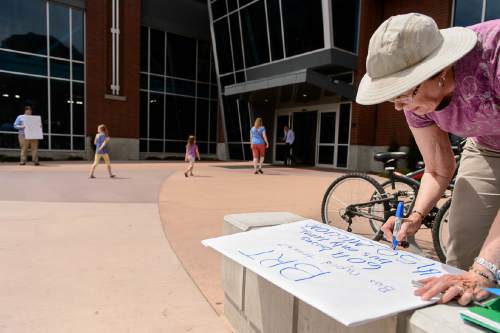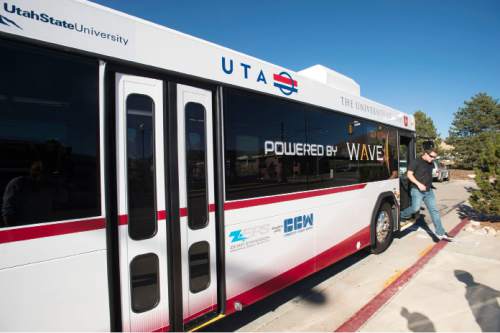This is an archived article that was published on sltrib.com in 2016, and information in the article may be outdated. It is provided only for personal research purposes and may not be reprinted.
Orem has formally rejected a referendum petition seeking to block a controversial transit project — and Provo says it will soon follow suit — so organizers say their next step to get the issue on the ballot is a direct appeal to the Utah Supreme Court.
"It's unfortunate [city officials] have made the decision to reject these petitions," said Frank Mylar, an attorney for grass-roots petition groups. "It's trying, obviously, to squelch the legislative role that the Utah Constitution has given the people."
The groups are trying to stop a $190 million "bus rapid transit" (BRT) system in Provo and Orem proposed by the Utah Transit Authority.
They seek to overturn no-cost leases recently approved by both city councils to allow use of some city streets for the project. The cities, however, contend those leases are "administrative actions" and not the sort of new city laws that the Utah Constitution allows residents to challenge through referendum.
Petition organizers said they were formally notified by Orem on Thursday that it rejected the petition. Provo Mayor John Curtis has told The Salt Lake Tribune that his city also plans to reject it soon, and he has approved a draft rejection letter.
So, Mylar said, "We've been ready and working" on the appeal, and they plan to file it shortly. He said the appeal will go directly to the Utah Supreme Court and will seek an expedited hearing so that if the grass-roots groups win, voters can cast ballots on the issue sooner than later.
Last week, the UTA Board approved launching the controversial project by gambling up to $23.8 million in advance funding that it says federal and county governments will almost surely reimburse later.
But the referendum groups complained that UTA is trying to speed up work so that voters would be less willing to stop it after large amounts have been spent.
UTA countered that starting now — before expected federal grants have been awarded and expected county bonds are issued — could save $3 million to $5 million in construction costs.
The referendum groups oppose the project, contending that it is too expensive, will complicate car traffic, and won't attract enough riders to justify its cost. They say thwarting the city street leases could stop the project by putting federal grants in jeopardy by changing federal-local cost share agreements.
Last week, acting UTA President and CEO Jerry Benson said even if referendums were successful, they would not kill the project. Those challenges would alter only small portions of the BRT where city streets are used, he said, not the major stretches on state highways.
UTA has long said that it would like the BRT buses to begin operating in spring 2018.
With BRT, extra-long buses will have reserved lanes for about half of the 10.5-mile Provo-Orem route. Passengers buy tickets from machines before boarding, and buses have extra doors to speed entry. Buses may receive priority at traffic signals and will arrive about every six minutes at peak times.
BRT would connect FrontRunner stations in Provo and Orem via Utah Valley University, University Mall, Brigham Young University, downtown Provo and the Provo Towne Centre mall.





